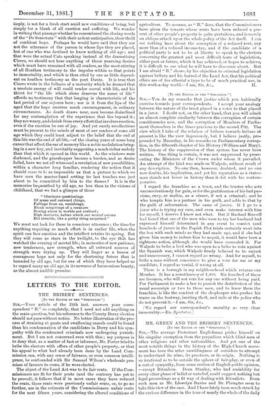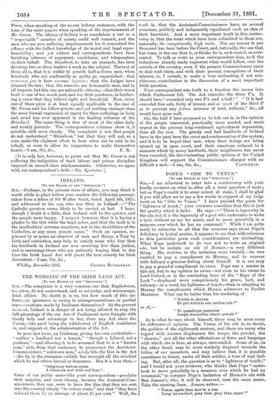MR. GREEN AND THE BRIBERY SENTENCES.
(To THE EDITOR OF THE " SPECTATOR."1
Stn,—The average Protestant Englishman prides himself on his singular exemption from the prejudices which blind men of other religions and other nationalities. And yet one of the most notable things in the history of the High-Church move- ment has been the utter unwillingness of outsiders to attempt to understand its aims, its practices, or its origin. Nothing is so irrational as to be outside the sphere of fair-play, or even of a sort of sympathy, from some section of English public opinion, —except Ritualism. Dean Stanley, who had amiability for every other phase of belief or unbelief, could suggest nothing but legal proceedings as a fit way of dealing with Ritualists. Even such men as Mr. Llewelyn Davies and Dr. Plumptre seem to take this view of the case. And I have lately been much struck by the curious difference in the tone of nearly the whole of the daily
Press, when speaking of the recent bribery sentences, with the tone of the same papers when speaking of the imprisonment of Mr. Green. The offence of bribery is as scandalous a one as a " respectable " member of society could well commit, and the men who are now suffering imprisonment for it committed the offence with the fullest knowledge of its moral and legal repre- hensibility; and yet editors and correspondents have been lavishing columns of argument, condolence, and vituperation on their behalf. The Standard, to take an example, has been devoting two or three leaders a week to the subject. The text of them all is, that it is unfair to punish half-a-dozen men, when hundreds who are confessedly as guilty go unpunished ; that summon jus is here summa injuria ; that the Judges have strained the law ; that the convicts are honourable men, and in all respects but this one are estimable citizens,—that their worst fault is one of too much zeal, and too little prudence, in further- ing a cause that they believe right and beneficial. Now, every one of these pleas is at least equally applicable to the case of Mr. Green and his fellow-priests, and yet nothing stronger than the most formal expression of regret for their sufferings in body and mind has ever appeared in the leading columns of the Standard. The same thing is true of most of the other daily and weekly journals. The correspondence columns show it, if possible, still more clearly. The complaint is not that people do not understand " Ritualism," but that they will not, as a rule, make the slightest effort to hear what can be said in its behalf, or even to allow its supporters to make themselves [It is only fair, however, to point out that Mr. Green is not suffering the indignities of hard labour and prison discipline imposed on second-class misdemeanants. Otherwise, we agree with our correspondent's drift.—Eo. Spectator.]







































 Previous page
Previous page